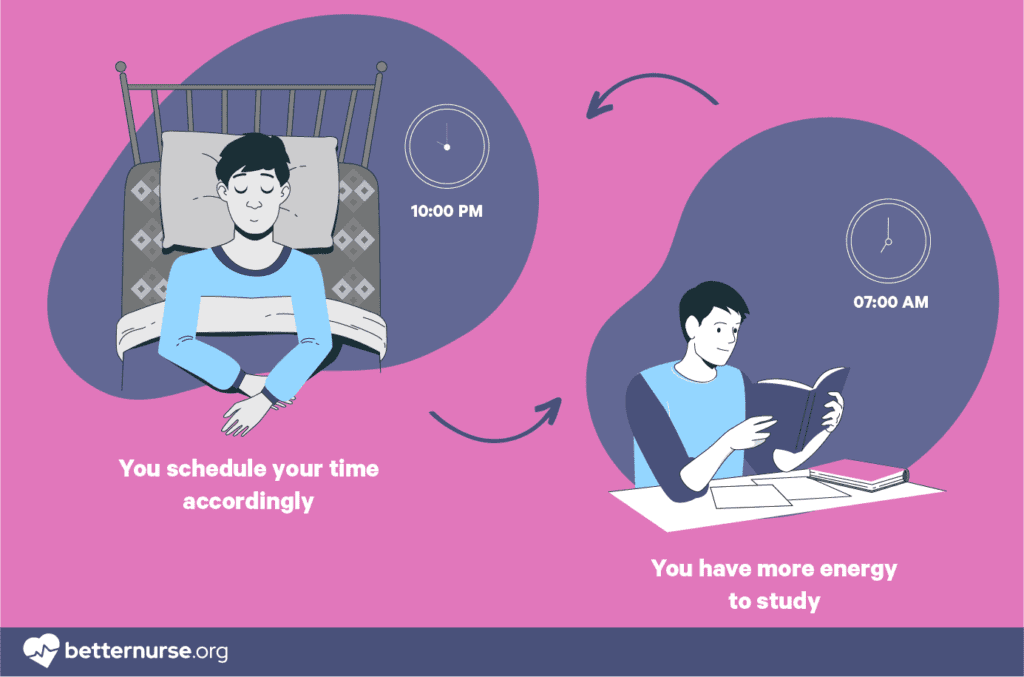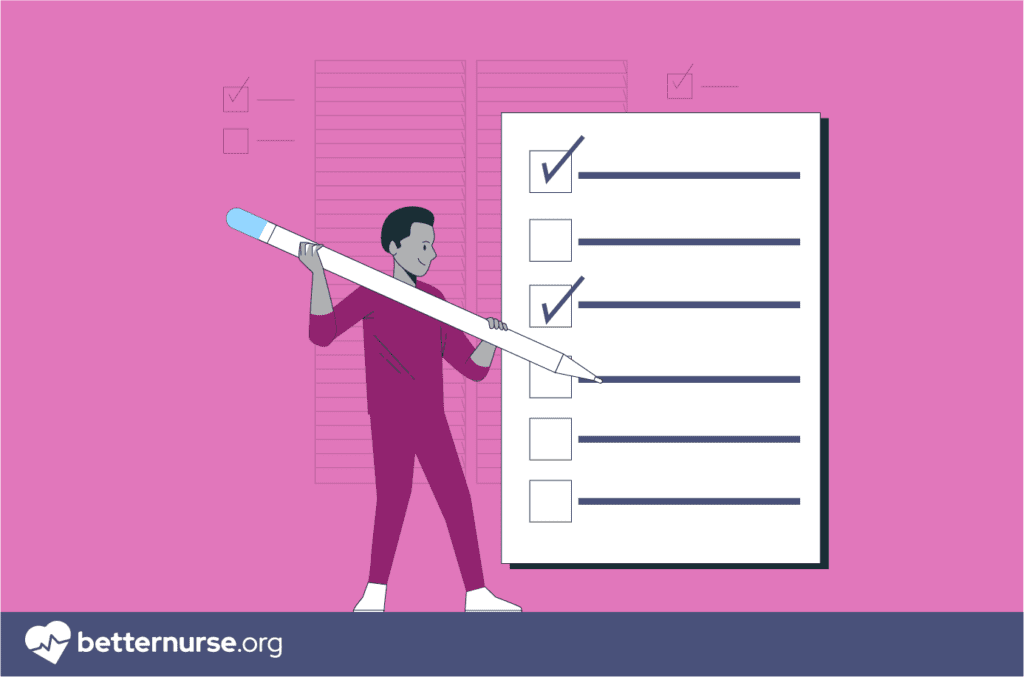The top study tips for nursing students include knowing your learning style, balancing study and personal time, setting objectives, and avoiding cramming for exams through revision, study guides, and study groups.
As a nursing student, it can be overwhelming to juggle your academic coursework, clinical experience, and personal life. However, with the right mindset and strategies, you can thrive in your nursing program and achieve academic success. The key is not to work harder to the point of burnout but to work smarter and use thorough planning to learn effectively.
Table of contents
- Takeaway
- 1. Know Your Learning Style
- 2. Schedule Your Study Time
- 3. Create Your Ideal Studying Environment
- 4. Create and Meet Your Learning Objectives
- 5. Avoid Cramming for Exams
- 6. Follow the Nursing Exam Study Guide
- 7. Prepare Before Class
- 8. Focus on the Topics Taught in Class
- 9. Form a Study Group
- 10. Take a Break When You Need a Break
- 11. Exercise and Eat Well
- 12. Get Quality Sleep
- 13. Practice, Practice, Practice
- Conclusion
Takeaway

Discovering the optimal approach to studying in nursing school is all about establishing a mutualism relationship between you as a nursing student and you as an individual. Both aspects must support and enhance one another. Rather than viewing your nursing career as a parasitic entity that progresses at the expense of your personal life, envision these two aspects as two organisms that can benefit from and help one another in order to achieve success.
1. Know Your Learning Style
The initial step is to determine your unique learning style, which will enable you to customize your study strategies to align with your preferences.
There are three primary learning modalities: visual, auditory, and kinesthetic. Typically, visual learners absorb information through sight, auditory learners through listening, and kinesthetic learners through hands-on experiences. It is not uncommon for individuals to excel using a blend of two or more modalities.
Remember, no single style is superior; the goal is to identify your ideal approach and adapt your study techniques accordingly.
2. Schedule Your Study Time
The next tip is to plan your study time accordingly and in advance. By planning, you can effectively manage your workload and avoid procrastination. Weekly or monthly, create a timetable that includes your classes, study hours, clinical rotations if you have any, as well as personal commitments. Then, try to stick to that schedule as closely as possible.
Following a schedule helps you keep track of your time, responsibilities, and goals.
3. Create Your Ideal Studying Environment
Studies show that choosing a comfortable and quiet space for studying is of paramount importance. According to their research, environmental variables such as lighting, temperature, and noise influence learning results.
Therefore, studying in a quiet, well-lit corner of your room, the library, a study room, or anywhere else with minimal distractions can help with your concentration and overall studying. Whereas if you were to study in uncomfortable or loud environments, you would find it more challenging to stay engaged.
4. Create and Meet Your Learning Objectives

Another tip to help you stay on track and achieve your academic goals is setting specific learning objectives and working toward meeting them. The link between goal-setting and performance has long been a topic of discussion. In the article “Toward a Theory of Task Motivation and Incentives,” Locke, an American psychologist, showed that goals and feedback motivate employees. Additionally, they highlighted the point that goals are also a major basis for performance improvement.
Therefore, breaking down your coursework into manageable sections and creating a study plan can help you achieve your objectives. Don’t forget to celebrate your achievements to keep yourself motivated.
5. Avoid Cramming for Exams
Studying in smaller but consistent increments is more effective than cramming for exams. The so-called spacing effect is based on observations that show learning is more effective when spaced in time as it produces stronger memories.
So, we recommend you start studying well in advance and regularly review your notes to strengthen your understanding of the material. As you dive into the next semester, you will retain the information you would have otherwise forgotten in a short period through cramming.
6. Follow the Nursing Exam Study Guide
Many nursing programs provide study guides to help you prepare for exams. These guides act as a roadmap for you to follow by highlighting the content and concepts you will most likely be tested on. Some others might also include sample questions, practice exams, and other resources that aim to help you better understand the course material.
Using such study guides can help you have a more structured approach to your exam-preparation period.
7. Prepare Before Class
According to Ebbinghaus’ Curve of Forgetting, people forget information over time unless they actively try to keep it there. The forgetting curve shows that learners forget around 90% of what they have learned within the first month.

However, to combat this model, you can work harder on retaining that information through material reviews before class. An excellent tip is to always read and review material before attending lectures based on the class syllabus. This will help you stay engaged during class, get the most out of each lecture, and reinforce your understanding of the material.
8. Focus on the Topics Taught in Class
Next, pay close attention to the topics covered in class and focus your studies on those areas. By doing so, you will find it much easier to structure your review sessions and thus reinforce your understanding of the material and prepare for exams. This step is especially crucial if you don’t have access to a nursing exam study guide.
9. Form a Study Group
A study group provides the opportunity to collaborate with your peers, share knowledge, and gain a deeper understanding of complex nursing concepts. So, we recommend you form or join a study group with other nursing students to meet regularly and review the material from lectures.
Combining collaborative and individual learning has proven to be an excellent approach for students as studies show that this combination allowed students to address misunderstandings with a partner as well as build fluency through individual problem-solving.
10. Take a Break When You Need a Break
A literature review of stress among nursing students suggests that nursing students, at minimum, deal with moderate stress levels as a group. It can be easy to get caught up in the high demands of the field. However, it is essential for all students, including those in nursing, to take regular breaks in order to avoid burnout.
Resting between study sessions provides you with room to recharge, avoid stress, and maintain your focus. This tip is crucial in ensuring that you do not ignore your physical and mental health while studying to take care of the health of others.
11. Exercise and Eat Well

As previously mentioned, the demanding nature of the nursing field can easily lead to students experiencing stress and overworking themselves. Therefore, it is worth emphasizing the need for students to take care of themselves throughout their college experience.
The World Health Organization (WHO) reports that eating a well-balanced diet provides the body with essential nutrients that fuel you with energy and generally ensure a stronger immune system, lower risk of non-communicable diseases, and overall longevity.
Engaging in regular physical activity can also be beneficial for students. According to the CDC (Centers for Disease Control), physically active students tend to have better grades. Furthermore, they claim that higher physical activity is associated with better cognitive performance among students.
12. Get Quality Sleep
Sleep is vital for brain performance, mood, and health. Therefore, you should try to have at least seven to eight hours of sleep per night to establish a regular sleep schedule that helps you get the rest you need.
However, keep in mind that it is not just about how much sleep you get but the quality of it too. Studies show that better sleep quality is linked to less insomnia and depression in students as well as an increase in the ability to study for more hours.
13. Practice, Practice, Practice
Last but not least, keep practicing. The more you practice, the better you will become at applying your knowledge to real-world scenarios. So, seek out any opportunities you can to practice your clinical skills. Regardless of your learning style, you can reinforce your understanding of various nursing concepts by simply putting everything into action.
Conclusion
Nursing programs are known for being rigorous and demanding. Therefore, it is easy to fall into the trap of overworking yourself. The trick is to utilize time management techniques, efficient study habits, prioritize self-care, and seek out resources such as study groups or study guides. This way, you can achieve academic success without sacrificing your well-being.

Nurse Luke is a CRNA who specializes in Nursing content and still enjoys a very busy career with Locum, Per Diem and Travel nursing in the greater midwest. He has over 25 years of experience in the healthcare field and received his CRNA masters degree from the Mayo Clinic School of Healthcare. He is passionate about helping nurses explore the options of becoming a travel nurse as well as spending time with his Family.



